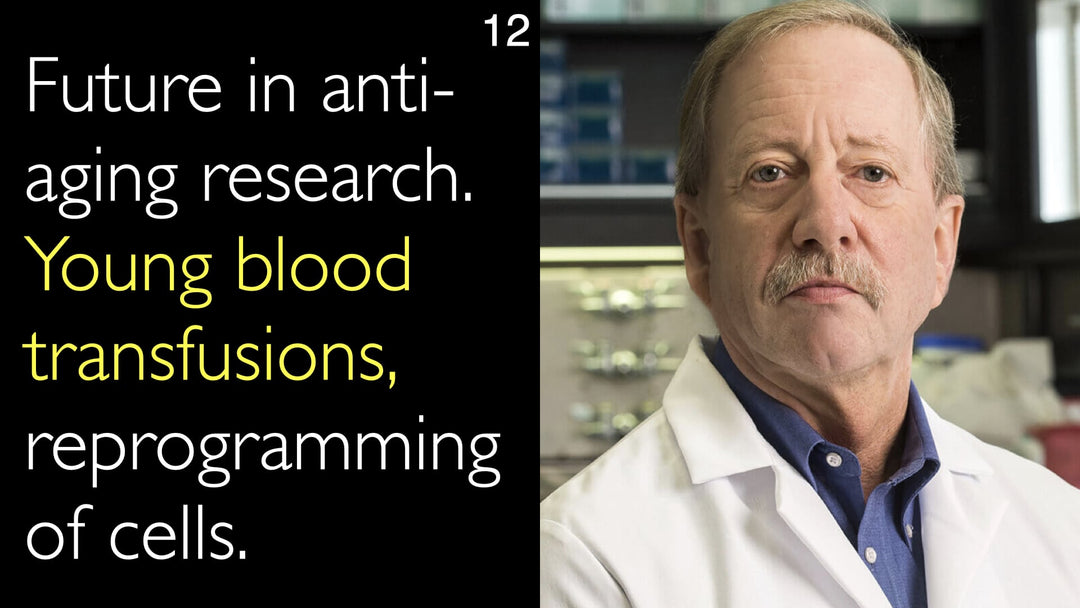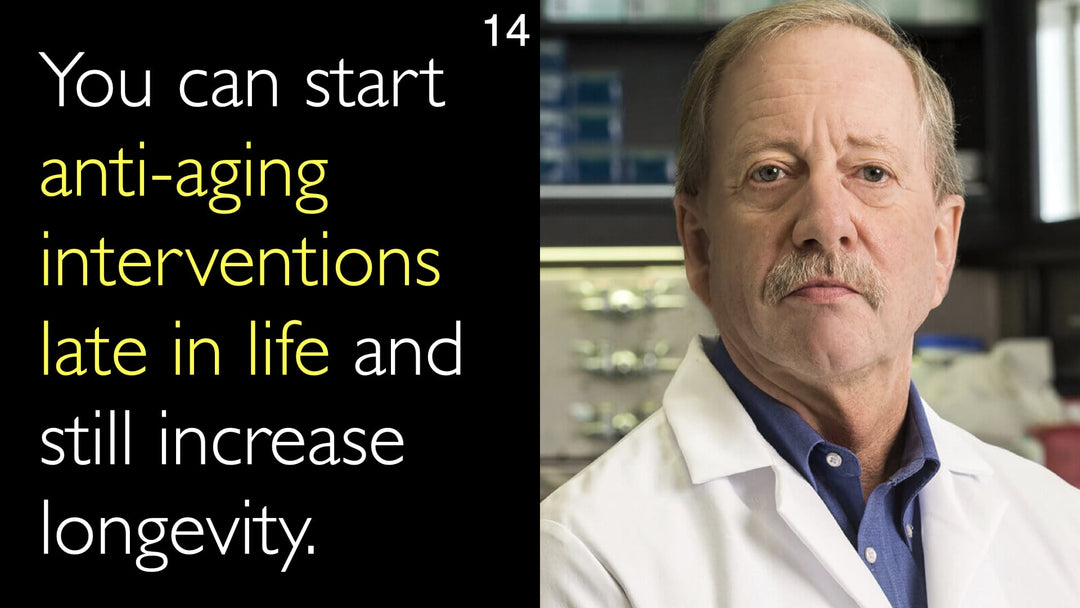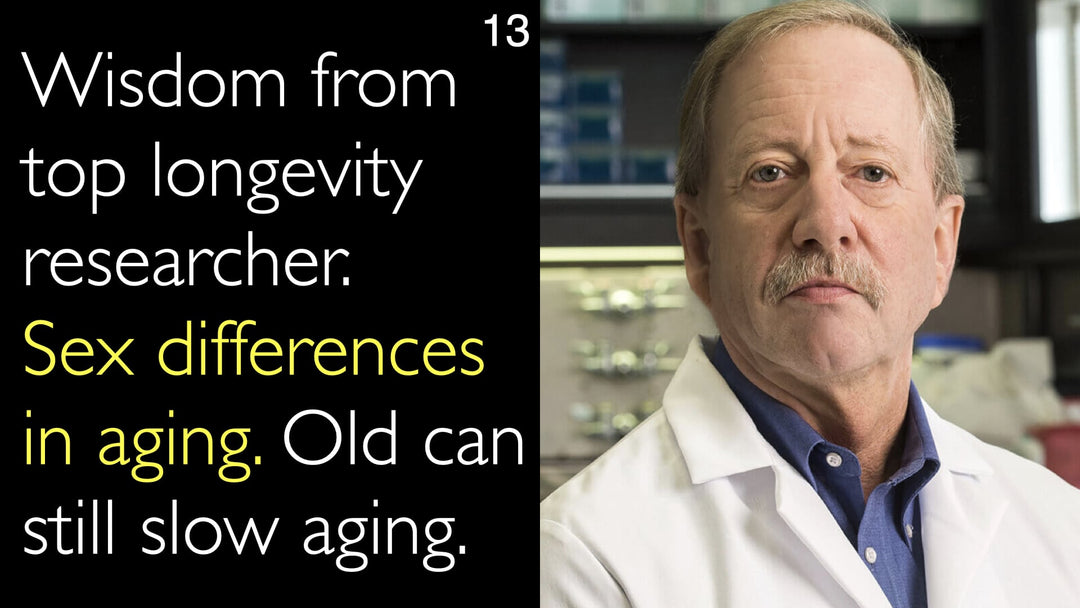Dr. Steven Austad, MD, PhD, ein führender Experte auf dem Gebiet der Altersbiologie, gibt Einblicke in die Zukunft der Anti-Aging-Forschung. Er beleuchtet vielversprechende neue Ansätze, die über gängige Medikamente wie Metformin und Rapamycin hinausgehen. Dr. Austad hebt insbesondere das Potenzial senolytischer Wirkstoffe und Transfusionen mit jungem Blut hervor. Zudem erörtert er das aufstrebende Feld der zellulären Reprogrammierung. Für die kommenden fünf bis zehn Jahre prognostiziert er bedeutende wissenschaftliche Durchbrüche.
Neue Horizonte in der Anti-Aging-Forschung und Langlebigkeitswissenschaft
Springe zu Abschnitt
- Jenseits aktueller Anti-Aging-Medikamente
- Senolytika zielen auf seneszente Zellen
- Verjüngung durch Jungbluttransfusionen
- Möglichkeiten der zellulären Reprogrammierung
- Zukünftige Durchbrüche in der Altersforschung
- Vollständiges Transkript
Jenseits aktueller Anti-Aging-Medikamente
Dr. Steven Austad, MD, PhD, ist überzeugt, dass die Anti-Aging-Forschung über bekannte Wirkstoffe hinauswachsen wird. Zwar sind Medikamente wie Rapamycin und Metformin etabliert, doch sie sind nicht perfekt. Dr. Austad erläutert, dass Rapamycin ein „unspezifisches Target“ darstellt und unerwünschte zelluläre Prozesse beeinflussen kann. Er erwartet die Entwicklung verfeinerter und wirksamerer Versionen dieser Substanzen. Diese pharmakologische Weiterentwicklung ist eine zentrale Zukunftsperspektive des Fachgebiets.
Senolytika zielen auf seneszente Zellen
Eine vielversprechende neue Klasse von Anti-Aging-Therapeutika sind senolytische Medikamente. Dr. Steven Austad, MD, PhD, beschreibt sie als faszinierende Wirkstoffe. Ihr Hauptmechanismus besteht darin, seneszente Zellen gezielt zu beseitigen. Diese gealterten, dysfunktionalen Zellen häufen sich im Laufe der Zeit an, begünstigen Entzündungen und Gewebedegeneration. Die Elimination dieser „Zombiezellen“ gilt als wirksame Strategie zur Verlängerung der Gesundheitspanne (Healthspan). Dr. Anton Titov, MD, diskutiert diesen Ansatz mit Dr. Austad als bedeutenden Fortschritt.
Verjüngung durch Jungbluttransfusionen
Die Forschung zu Jungbluttransfusionen eröffnet revolutionäre Perspektiven. Dr. Steven Austad, MD, PhD, verweist auf umfangreiche Mausstudien, die verjüngende Effekte belegen. Die Infusion von jungem Blut in ältere Tiere hat bemerkenswerte Anti-Aging-Wirkungen gezeigt. Die genauen Mechanismen sind noch nicht vollständig geklärt. Dr. Austad vermutet, dass der Schlüssel in der Identifizierung spezifischer verjüngender Substanzen im jungen Blut liegen könnte. Langfristiges Ziel könnte die Entwicklung einer Tablette sein, die diese Effekte nachahmt und Transfusionen überflüssig macht.
Möglichkeiten der zellulären Reprogrammierung
Die zelluläre Reprogrammierung eröffnet weitere Wege für Anti-Aging-Ansätze. Heute ist es möglich, eine adulte Zelle in einen embryonalen Stammzellzustand zurückzuversetzen, indem bestimmte Gene aktiviert werden. Dr. Steven Austad, MD, PhD, sieht Potenzial in einer partiellen Reaktivierung dieser Gene. Eine solche partielle Reprogrammierung könnte Zellen verjüngen, ohne ihre Identität zu verlieren. Diese Technologie könnte eine wirksame Methode zur Umkehrung zellulärer Alterungsprozesse im gesamten Körper bieten.
Zukünftige Durchbrüche in der Altersforschung
Die spannendsten Entwicklungen könnten jene sein, die heute noch unbekannt sind. Dr. Steven Austad, MD, PhD, betont die derzeitige Dynamik in der Altersforschung. Diese intensive wissenschaftliche Arbeit wird voraussichtlich zu völlig unerwarteten Entdeckungen führen. Er hofft, dass die Diskussion in fünf bis zehn Jahren nicht mehr dieselbe sein wird – ein Zeichen rascher Fortschritte. Dr. Anton Titov, MD, und Dr. Austad sind sich einig, dass dies eine äußerst aufregende Zeit für das Fachgebiet ist. Das nächste Jahrzehnt verspricht, unseren Umgang mit Alterung und Langlebigkeit grundlegend zu verändern.
Vollständiges Transkript
Dr. Anton Titov, MD: Professor Austad, wie sieht die Zukunft der Anti-Aging-Forschung aus? Welche Richtungen erscheinen Ihnen mit Ihrer jahrzehntelangen Erfahrung am vielversprechendsten? Worüber werden wir in fünf bis zehn Jahren sprechen? Wird es weiterhin um Metformin, Rapamycin und Kalorienrestriktion gehen? Oder zeichnen sich gänzlich neue, vielversprechende Ansätze ab?
Dr. Steven Austad, MD: Ich hoffe, in fünf bis zehn Jahren nicht mehr über dieselben Themen zu sprechen, denn das würde bedeuten, dass die Wissenschaft ins Stocken geraten ist. Es gibt viele vielversprechende Entwicklungen. Zum einen verstehen wir, wie Rapamycin wirkt und was es in der Zelle bewirkt. Allerdings ist sein Target unspezifisch – es greift auch in Prozesse ein, die wir lieber unberührt lassen würden.
Wir werden bessere Versionen dieser Medikamente entwickeln, verbesserte Varianten von Metformin und Rapamycin. Daneben zeichnen sich aber auch völlig neue Fortschritte ab.
Senolytika sind neue Wirkstoffe, die seneszente Zellen gezielt abtöten. Faszinierend sind auch Arbeiten zum Blutaustausch. Zahlreiche Mausstudien zeigen verjüngende Effekte, wenn jungen Tieren Blut älterer Artgenossen infundiert wird. Noch ist unklar, wie genau das funktioniert.
Doch ich bin zuversichtlich, dass wir das herausfinden werden. Vielleicht bleiben Menschen jung, indem sie gelegentlich eine Infusion mit bestimmten Substanzen erhalten. Möglicherweise gelingt es sogar, eine Tablette zu entwickeln. Diese Jungblut-Forschung wird meiner Einschätzung nach völlig neue Möglichkeiten eröffnen.
Ein weiteres Feld mit großem Potenzial ist die Reprogrammierung unserer Zellen. Wir können heute eine adulte Zelle nehmen und sie praktisch in eine embryonale Stammzelle zurückverwandeln, indem wir bestimmte Gene aktivieren.
Es wird Wege geben, diese Gene teilweise zu reaktivieren, was verjüngend wirken könnte – ähnlich wie bei den Jungblut-Ansätzen. Ich bin überzeugt, dass sich diese Bereiche in den nächsten fünf bis zehn Jahren erheblich weiterentwickeln werden.
Meine Vermutung ist aber, dass die größten Durchbrüche von Ideen kommen werden, die heute noch niemand auf dem Schirm hat – angestoßen durch die derzeitige Flut an Forschungsaktivitäten zum Altern.
Dr. Anton Titov, MD: Professor Austad, das sind äußerst spannende Perspektiven mit vielen faszinierenden Möglichkeiten.






